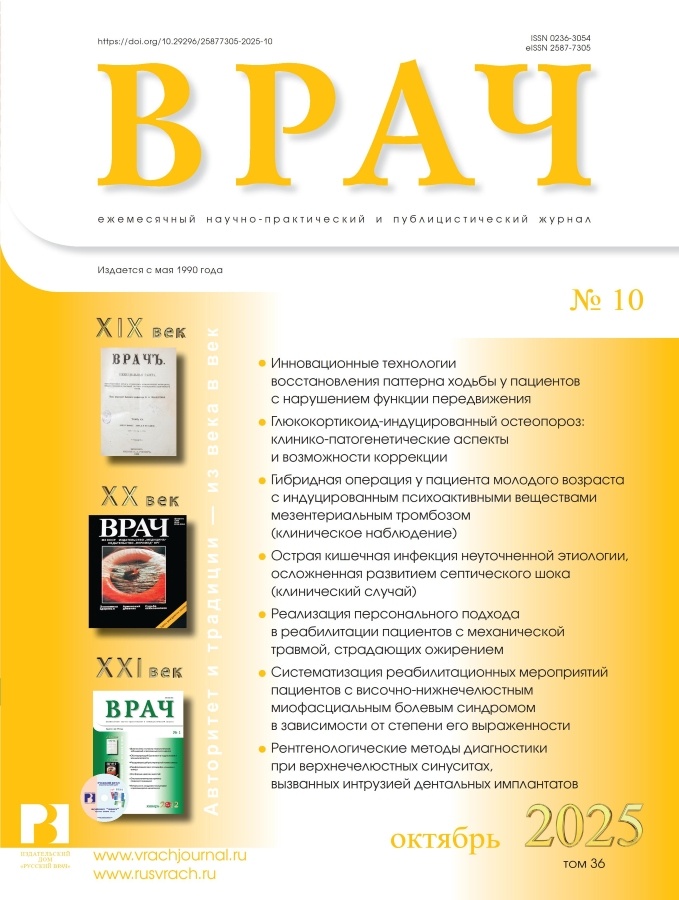Experience of vertical preparation of teeth in orthopedic treatment
- Authors: Morgachev R.Y.1, Kunin V.A.1
-
Affiliations:
- N.N. Burdenko Voronezh State Medical University
- Issue: Vol 36, No 10 (2025)
- Pages: 60-64
- Section: From Practice
- URL: https://journals.eco-vector.com/0236-3054/article/view/696307
- DOI: https://doi.org/10.29296/25877305-2025-10-12
- ID: 696307
Cite item
Abstract
Objective. To develop a modernized protocol for vertical preparation.
Materials and methods. The study involved 119 patients divided into two groups with vertical and horizontal preparation. The analysis of functional and clinical indicators included an assessment of the Muhlemann-Cowell index, Kulazhenko test and a number of periodontal indices.
Results. Vertical preparation provided a 30% reduction in the loss of hard tooth tissue compared to horizontal, and also minimized the incidence of complications, including gingival inflammation, gingival recession and instability of the marginal fit of the crown. Vertical preparation contributes to the formation of an optimal soft tissue profile, an increase in the height of the crown part of the tooth and an even distribution of the chewing load. The technique has proven its effectiveness, which is confirmed by the improvement of macroretention and durability of orthopedic structures, as well as a reduction in the risk of complications.
Conclusion. The developed protocol of vertical preparation is recommended for implementation in orthopedic practice to improve the quality of rehabilitation of patients with defects in the hard tissues of the teeth, partial adentia and periodontal tissue diseases.
Full Text
About the authors
R. Y. Morgachev
N.N. Burdenko Voronezh State Medical University
Author for correspondence.
Email: morgachev95@list.ru
Russian Federation, Voronezh
V. A. Kunin
N.N. Burdenko Voronezh State Medical University
Email: morgachev95@list.ru
SPIN-code: 2718-3123
Professor, MD
Russian Federation, VoronezhReferences
- Rathee M., Sapra A. Dental Caries. 2023 Jun 21. In: StatPearls [Internet]. Treasure Island (FL): StatPearls Publishing, 2024.
- Pitts N.B., Twetman S., Fisher J. et al. Understanding dental caries as a non-communicable disease. Br Dent J. 2021; 231 (12): 749–53. doi: 10.1038/s41415-021-3775-4
- Kotsanos N., Papagerakis P., Sarnat H. et al. Developmental Defects of the Teeth and Their Hard Tissues. Pediatric Dentistry Textbooks in Contemporary Dentistry, 2022; pp. 415–63. doi: 10.1007/978-3-030-78003-6_17
- Брудян Г.С., Хабибулина М.М., Струков В.И. и др. Остеоинтеграция зубных имплантатов при климактерическом остеопорозе: стратегии оптимизации, пути и перспективы решения проблемы. Врач. 2023; 34 (7): 80–6 [Brudyan G., Khabibulina M., Strukov V. et al. Osteointegration of dental implants in menopausal osteoporosis: optimization strategies, ways and prospects of solving the problem. Vrach. 2023; 34 (7): 80–6 (in Russ.)]. doi: 10.29296/25877305-2023-07-18
- Dorado S., Arias A., Jimenez-Octavio J.R. Biomechanical Modelling for Tooth Survival Studies: Mechanical Properties, Loads and Boundary Conditions-A Narrative Review. Materials (Basel). 2022; 15 (21): 7852. doi: 10.3390/ma15217852
- Babaei B., Cella S., Farrar P. et al. The influence of dental restoration depth, internal cavity angle, and material properties on biomechanical resistance of a treated molar tooth. J Mech Behav Biomed Mater. 2022; 133: 105305. doi: 10.1016/j.jmbbm.2022.105305
- Lacruz R.S., Habelitz S., Wright J.T. et al. Dental enamel formation and implications for oral health and disease. Physiol Rev. 2017; 97 (3): 939–93. doi: 10.1152/physrev.00030.2016
- Chapple I.L.C., Mealey B.L., Van Dyke T.E. et al. Periodontal health and gingival diseases and conditions on an intact and a reduced periodontium: Consensus report of workgroup 1 of the 2017 World Workshop on the Classification of Periodontal and Peri-Implant Diseases and Conditions. J Periodontol. 2018; 89 (Suppl 1): S74–S84. doi: 10.1002/JPER.17-0719
- Kissa J., Albandar J.M., El Houari B. et al. National survey of periodontal diseases in adolescents and young adults in Morocco. J Clin Periodontol. 2022; 49 (5): 439–47. doi: 10.1111/jcpe.13613
- Балин К.Д., Борисова Э.Г., Федичкина М.К. Оценка уровня качества жизни пациентов после стоматологических вмешательств. Проблемы стоматологии. 2021; 17 (1): 5–11 [Balin K.D., Borisova E.G., Fedichkina M.K. Assessment of the quality of life of patients after dental interventions (literature review). Actual problems in dentistry. 2021; 17 (1): 5–11. (in Russ.)]. doi: 10.18481/2077-7566-20-17-1-5-11
- Kanno T., Carlsson G.E. A review of the shortened dental arch concept focusing on the work by the Käyser/Nijmegen group. J Oral Rehabil. 2006; 33 (11): 850–62. doi: 10.1111/j.1365-2842.2006.01625.x
- Molek, Erawati S., Fitriana D. The Effect of One-Sided Chewing Habits on the Occurrence of Caries, Calculus, and Oral Status Hygiene in Students of SMP Islam Terpadu Nurul Fadhilah, Percut Sei Tuan District, Deli Serdang Regency, Indonesia. Community Medicine and Education Journal. 2024; 5 (1): 433–7. doi: 10.37275/cmej.v5i1.467
- Lekaviciute R., Kriauciunas A. Relationship Between Occlusal Factors and Temporomandibular Disorders: A Systematic Literature Review. Cureus. 2024; 16 (2): e54130. doi: 10.7759/cureus.54130
- Латиф А.Р., Воробьева Ю.Б., Малышева Д.Д. и др. Лабораторное исследование и клиническое применение адгезивного обеспечения краевого прилегания реставраций твердых тканей зубов. Российский стоматологический журнал. 2022; 26 (6): 487–95 [Latif A.R., Vorobyeva Y.B., Malysheva D.D. et al. Laboratory study and clinical application of adhesive marginal fit of dental hard tissue restorations. Russian Journal of Dentistry. 2022; 26 (6): 487–95 (in Russ.)]. doi: 10.17816/dent112582
- Navdeep Singh, Parag Dua Sonam Yangchen, Thiruvalluvan N et al. Vertical tooth preparation technique in aesthetic zone: Report of two patients. IP Annals of Prosthodontics and Restorative Dentistry. 2023; 9: 39–43. doi: 10.18231/j.aprd.2023.008
- Assiri A.Y.K., Saafi J., Al-Moaleem M.M. et al. Ferrule effect and its importance in restorative dentistry: A literature Review. J Popul Ther Clin Pharmacol. 2022; 29 (4): e69-e82. doi: 10.47750/jptcp.2022.977
Supplementary files









